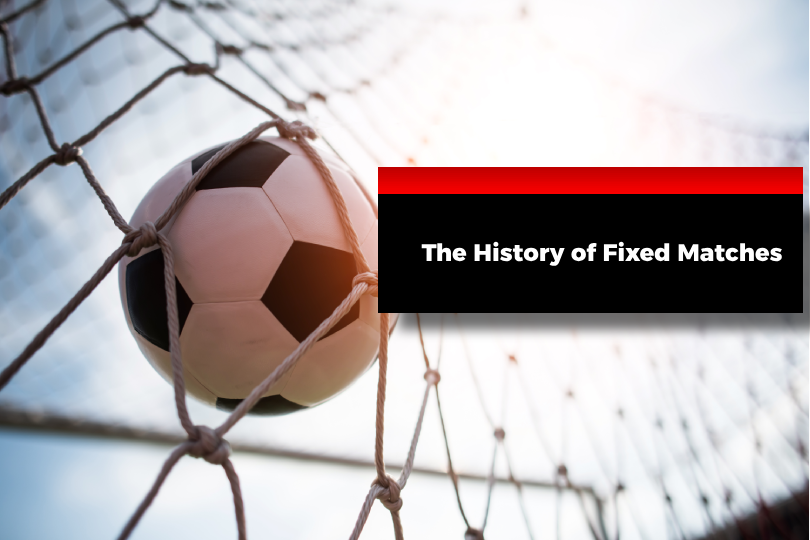Football is the world’s most popular sport, watched and loved by millions of fans across the globe. However, like many other sports, football has not been immune to scandal and controversy, particularly when it comes to match-fixing. Fixed matches, where the outcome of a game is manipulated, have tarnished the reputation of the sport over the years. This article explores the history of match-fixing in football, including early instances, major scandals, and its ongoing impact on the game.
Early History of Match-Fixing in Football
The practice of fixing matches has been around for almost as long as football itself. Early records from the late 19th and early 20th centuries reveal that match-fixing was a concern even in the early days of the sport. One of the first recorded instances of match-fixing occurred in 1915, during a wartime English Football League match between Manchester United and Liverpool. Several players from both teams were found guilty of conspiring to fix the outcome, resulting in suspensions and bans. This scandal shook the football community and highlighted how vulnerable the sport was to manipulation.
The Growth of Organized Match-Fixing
As football became more commercialized, the stakes grew higher, and so did the attempts to manipulate results. By the mid-20th century, match-fixing had become more organized, involving not just players, but also referees, coaches, and even club officials. One of the most infamous cases in European football history is the Italian “Totonero” scandal in 1980, where several Serie A and Serie B clubs were found guilty of fixing matches for betting purposes. Prominent clubs like AC Milan and Lazio were relegated, and numerous players received bans.
This scandal was a wake-up call for football authorities, leading to stricter regulations and oversight. However, it did not eliminate the problem.
The Globalization of Match-Fixing
With the rise of global football and the growth of betting markets, match-fixing took on an international dimension. In the 1990s and early 2000s, the problem became particularly widespread in Asia, where illegal betting syndicates had a huge influence on football results across the globe. These syndicates often targeted lower-league teams or underpaid players, offering them financial incentives to manipulate match outcomes.
One of the most notorious global match-fixing scandals was uncovered in 2013, when Europol, the European law enforcement agency, revealed that over 380 matches had been fixed across Europe, including World Cup qualifiers and Champions League games. The scandal was linked to organized crime groups operating in Asia, who used bribery and intimidation to fix the results.
Famous Match-Fixing Scandals in Football
Here are some of the most famous match-fixing scandals in football history:
- Calciopoli (2006): Another Italian scandal, Calciopoli, rocked Serie A when it was discovered that several top clubs, including Juventus, AC Milan, and Fiorentina, had influenced referee appointments to gain favorable decisions. Juventus was relegated to Serie B, and multiple officials and players were banned.
- German Bundesliga Scandal (1971): In one of the biggest scandals in German football history, players from several Bundesliga clubs were involved in fixing matches to ensure certain results for financial gain. Over 50 players, coaches, and officials were banned or fined.
- Brazilian Match-Fixing Scandal (2005): Known as the “Whistle Mafia”, this scandal involved referees being paid to manipulate match outcomes in Brazil’s top leagues. The scandal resulted in 11 matches being replayed, and several referees received lifetime bans.
How Match-Fixing Happens
Match-fixing can take various forms, including:
- Outcome Fixing: Manipulating fixed the final result of a match (e.g., ensuring a particular team wins or loses).
- Spot Fixing: Manipulating specific events within a game, such as the number of corners, yellow cards, or even the time of the first goal.
- Referee Manipulation: Ensuring that a referee favors one team through biased decisions, such as awarding penalties or red cards.
Match-fixing often involves criminal organizations who use threats, bribery, or financial incentives to convince players, referees, or coaches to participate. The growing role of online betting has made it easier for these groups to profit from manipulated results, especially in lower leagues where oversight is often weaker.
The Impact of Match-Fixing on Football
Match-fixing not only undermines the integrity of the sport but also damages the trust of fans, sponsors, and broadcasters. When results are manipulated, it distorts the fairness of competition and can lead to financial losses for clubs, fans, and legal betting markets.
Football governing bodies, such as FIFA and UEFA, have introduced measures to combat match-fixing, including stricter monitoring of betting patterns, education programs for players, and harsher penalties for those involved. However, the problem persists, particularly in lower-league games and countries with less stringent regulations.
How to Spot Potentially Fixed Matches
While it’s impossible for the average fan to know for certain if a match has been fixed, there are some warning signs that experts look for:
- Unusual Betting Patterns: Sudden large bets on unlikely outcomes can indicate that a match is being manipulated.
- Strange On-Field Behavior: Players making uncharacteristic mistakes or referees making inexplicable decisions can sometimes be a sign of manipulation.
- Lopsided Results: When an underdog team unexpectedly defeats a much stronger opponent with ease, it can raise suspicions of fixing.
Conclusion
Fixed matches have cast a long shadow over football’s history, from early scandals like the 1915 Manchester United-Liverpool game to modern-day corruption linked to international betting syndicates. While governing bodies have made strides in combating match-fixing, the problem continues to plague the sport.
For fans and players alike, it’s essential to remain vigilant and support efforts to preserve the integrity of the game. Only through strict enforcement and awareness can football maintain its status as a fair and competitive sport.







